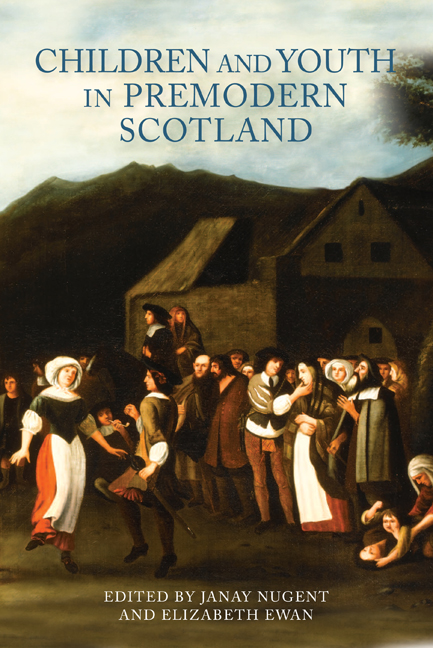Book contents
- Frontmatter
- Dedication
- Contents
- List of Illustrations
- Notes on Contributors
- Acknowledgments
- Abbreviations and Conventions
- Introduction: Adding Age and Generation as a Category of Historical Analysis
- Part I Experiences of Childhood and Youth
- Part II Representations of the Young
- Part III Constructing the Next Generation
- Envoi In Their Own Words: A Mother to Her Son
- Guide to Further Reading
- Index
- St Andrew Studies in Scottish History
10 - ‘At thair perfect age’: Elite Child Betrothal and Parental Control, 1430–1560
Published online by Cambridge University Press: 11 May 2021
- Frontmatter
- Dedication
- Contents
- List of Illustrations
- Notes on Contributors
- Acknowledgments
- Abbreviations and Conventions
- Introduction: Adding Age and Generation as a Category of Historical Analysis
- Part I Experiences of Childhood and Youth
- Part II Representations of the Young
- Part III Constructing the Next Generation
- Envoi In Their Own Words: A Mother to Her Son
- Guide to Further Reading
- Index
- St Andrew Studies in Scottish History
Summary
In 1557 a marriage contract was signed by James Ogilvy of Balnagerro and John Ogilvy of Innerquhairty for the betrothal of their respective children, Christian Ogilvy and Walter Ogilvy. This contract stipulated that if the groom died before the wedding he was to be replaced by his brother James, and if James died, by their third brother, Andrew. The under-age couple was not expected to marry immediately but instead were to wed ‘at thair perfect age’. This example was not out of the ordinary, as childhood betrothal was an important familial strategy for Scotland's nobles and lairds in the centuries preceding the Reformation. The nature of these betrothals was such that parents frequently disregarded the wishes of their children and the teachings of the Church in order to arrange the ideal match. Parents in lairdly and noble families in late medieval Scotland cared about their children, but they were also concerned with the management of their estates and status – fluid measures of social worth – that could be strengthened through marriage. Parents maintained control over the marriages of their children by retaining control over the lands and monies that were necessary to contribute to dowries, dowers and jointly held property. As a result, children were critical social capital and were often at the centre of family strategies to advance the legacy of their lineage, yet some of these betrothed youth did manage to assert agency in determining their own futures.
Historians have disagreed considerably about the emotional value medieval children had for their parents. In the mid-twentieth century, Philippe Ariès speculated about whether medieval parents, facing a high child mortality rate, invested emotionally in their children. There is now a broad consensus among medieval historians that children were held with affection in their families. Although largely debunked, Ariès's thesis did spur historians to examine the value children held in society. Beyond their emotional connections to their families, noble and lairdly children were pivotal in a culture obsessed with lineage and legacy. Not only did children ensure the continuation of a family's nobility and honour, but a judicious marriage also had the potential to advance a kin group. For some lairds and nobles, their strategy to ensure a good outcome for their children on the marriage market was to initiate marriage plans while the children were young. This could bring the nobility into conflict with the Church courts.
- Type
- Chapter
- Information
- Children and Youth in Premodern Scotland , pp. 173 - 186Publisher: Boydell & BrewerPrint publication year: 2015



